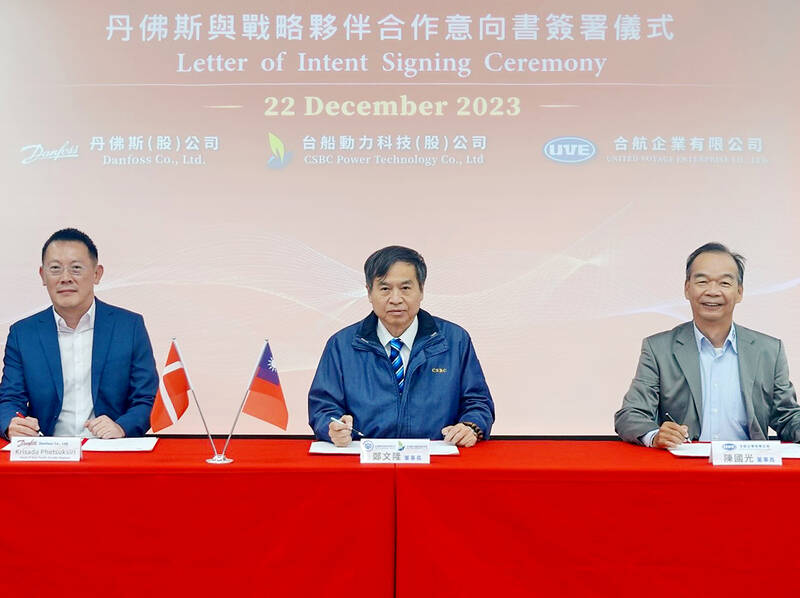CSBC Power Technology Co (台船動力) has recently signed a letter of intent with Danish multinational engineering group Danfoss A/S as it aims to provide more efficient and cost-effective electric ship propulsion systems, while tapping into the electric ship business worth tens of billions of dollars, its parent company CSBC Corp, Taiwan (台灣國際造船) said yesterday.
“Clean energy and power have become a trend in the transportation industry. Forty-seven point six percent, or nearly half, of new European cars are electric vehicles. I believe that electric ships will also catch up with this trend,” CSBC Corp chairman Cheng Wen-lon (鄭文隆) said in a statement.
Cheng also serves as chairman of CSBC Power, which has paid-in capital of NT$75 million (US$2.4 million), of which 87 percent is held by CSBC Corp, the nation’s largest shipbuilding company, with one shipyard each in Keelung and Kaohsiung.

Photo courtesy of CSBC Corp, Taiwan
CSBC Power specializes in the research and development of integrated electric ship energy storage batteries and power systems. Its technical team has many years of experience in ship electrification, the firm said.
The company’s aim is to achieve the localization of megawatt-level electric vessel development in Taiwan, with advanced integrated technology, system design and assembly capabilities, it said.
Danfoss, headquartered in Nordborg, Denmark, has solid electric propulsion technology and enjoys a lead position in the global market, the statement said. The multinational company has been promoting the green transformation of the shipping industry in the past few years, it said.
Through the strategic collaboration with Danfoss, CSBC Power hopes to gradually integrate key technologies — such as electric propulsion systems, shaft generators, main and auxiliary engines and AC-DC converters — into megawatt-level electric ships, company chief executive officer Wang Shuo-ping (王碩彬) said.
The companies signed the letter at CSBC Power’s headquarters in Keelung on Dec. 22 last year with the attendance of Cheng, Danfoss Drives’ head of Asia-Pacific and India regions Krisada Phetsuksiri and United Voyage Enterprise Co (合航企業) chairman Kenneth Chen (陳國光), another strategic partner in the deal, CSBC Corp said.

KEEPING UP: The acquisition of a cleanroom in Taiwan would enable Micron to increase production in a market where demand continues to outpace supply, a Micron official said Micron Technology Inc has signed a letter of intent to buy a fabrication site in Taiwan from Powerchip Semiconductor Manufacturing Corp (力積電) for US$1.8 billion to expand its production of memory chips. Micron would take control of the P5 site in Miaoli County’s Tongluo Township (銅鑼) and plans to ramp up DRAM production in phases after the transaction closes in the second quarter, the company said in a statement on Saturday. The acquisition includes an existing 12 inch fab cleanroom of 27,871m2 and would further position Micron to address growing global demand for memory solutions, the company said. Micron expects the transaction to

Vincent Wei led fellow Singaporean farmers around an empty Malaysian plot, laying out plans for a greenhouse and rows of leafy vegetables. What he pitched was not just space for crops, but a lifeline for growers struggling to make ends meet in a city-state with high prices and little vacant land. The future agriculture hub is part of a joint special economic zone launched last year by the two neighbors, expected to cost US$123 million and produce 10,000 tonnes of fresh produce annually. It is attracting Singaporean farmers with promises of cheaper land, labor and energy just over the border.

US actor Matthew McConaughey has filed recordings of his image and voice with US patent authorities to protect them from unauthorized usage by artificial intelligence (AI) platforms, a representative said earlier this week. Several video clips and audio recordings were registered by the commercial arm of the Just Keep Livin’ Foundation, a non-profit created by the Oscar-winning actor and his wife, Camila, according to the US Patent and Trademark Office database. Many artists are increasingly concerned about the uncontrolled use of their image via generative AI since the rollout of ChatGPT and other AI-powered tools. Several US states have adopted

A proposed billionaires’ tax in California has ignited a political uproar in Silicon Valley, with tech titans threatening to leave the state while California Governor Gavin Newsom of the Democratic Party maneuvers to defeat a levy that he fears would lead to an exodus of wealth. A technology mecca, California has more billionaires than any other US state — a few hundred, by some estimates. About half its personal income tax revenue, a financial backbone in the nearly US$350 billion budget, comes from the top 1 percent of earners. A large healthcare union is attempting to place a proposal before